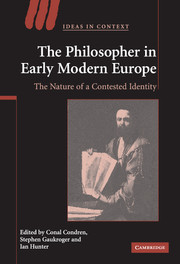Book contents
- Frontmatter
- Contents
- List of contributors
- Acknowledgements
- Introduction
- 1 The persona of the natural philosopher
- 2 The university philosopher in early modern Germany
- 3 The persona of the philosopher and the rhetorics of office in early modern England
- 4 From Sir Thomas More to Robert Burton: the laughing philosopher in the early modern period
- 5 Hobbes, the universities and the history of philosophy
- 6 The judicial persona in historical context: the case of Matthew Hale
- 7 Persona and office: Althusius on the formation of magistrates and councillors
- 8 Descartes as sage: spiritual askesis in Cartesian philosophy
- 9 The natural philosopher and the virtues
- 10 Fictions of a feminine philosophical persona: Christine de Pizan, Margaret Cavendish and philosophia lost
- 11 John Locke and polite philosophy
- Index
- IDEAS IN CONTEXT
8 - Descartes as sage: spiritual askesis in Cartesian philosophy
Published online by Cambridge University Press: 06 November 2009
- Frontmatter
- Contents
- List of contributors
- Acknowledgements
- Introduction
- 1 The persona of the natural philosopher
- 2 The university philosopher in early modern Germany
- 3 The persona of the philosopher and the rhetorics of office in early modern England
- 4 From Sir Thomas More to Robert Burton: the laughing philosopher in the early modern period
- 5 Hobbes, the universities and the history of philosophy
- 6 The judicial persona in historical context: the case of Matthew Hale
- 7 Persona and office: Althusius on the formation of magistrates and councillors
- 8 Descartes as sage: spiritual askesis in Cartesian philosophy
- 9 The natural philosopher and the virtues
- 10 Fictions of a feminine philosophical persona: Christine de Pizan, Margaret Cavendish and philosophia lost
- 11 John Locke and polite philosophy
- Index
- IDEAS IN CONTEXT
Summary
INTRODUCTION: THE CARTESIAN MASK
In one of his earliest surviving writings Descartes says that just as actors put on masks (personam induunt), so he himself will enter the theatre of the world masked: larvatus prodeo. ‘Mask’ was, of course, the original meaning of the Latin term persona – in Greek prosopon: the false face of clay or bark that actors in the ancient world donned in order to come on to the stage. It is an odd figure of speech for a philosopher to adopt: both in classical philosophical thought (from Plato's famous strictures against acting and role-playing), and also in the Christian gospels (from Jesus' denunciation of those whose outward display did not match their inner thoughts), the connotations of the term ‘actor’ (hypocrites) were far from favourable.
What persona did Descartes himself have in mind? We are apt, in the light of popular contemporary psychology, to think of a persona as some kind of false self-presentation; but the ancient theatrical persona was a formal, stylised device, whose purpose was not so much simulation as dissimulation. Going on stage is a daunting business, and the mask conceals awkwardness and embarrassment (a point that Descartes himself makes quite explicitly). By hiding his nervousness, or simply the unprepossessing ordinary features that might be familiar to the audience, the actor could pronounce his lines with more confidence.
So it may be that the young Descartes is simply recording his shyness – his reluctance to make a stir.
- Type
- Chapter
- Information
- The Philosopher in Early Modern EuropeThe Nature of a Contested Identity, pp. 182 - 201Publisher: Cambridge University PressPrint publication year: 2006
- 3
- Cited by



